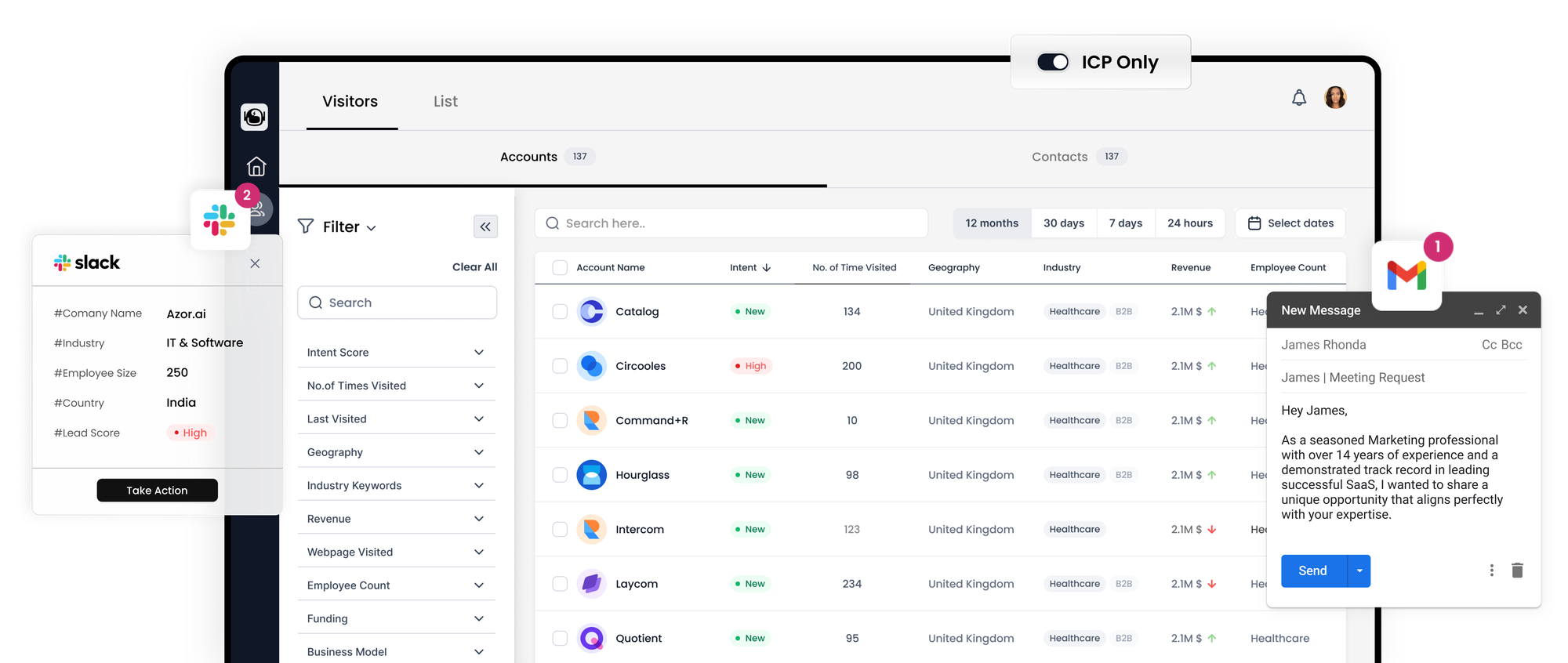Enhancing Sales Insights with Website Visitor Tracking

Your website serves as a potent sales tool, offering a treasure trove of information about the anonymous companies exploring your products or services. By meticulously tracking your website visitors across various activities such as page views and content downloads, you can unlock valuable insights into which businesses are showing interest in your solutions. This data also plays a pivotal role in retargeting efforts and personalized content creation, both essential components of an effective account-based marketing strategy.

Identifying Anonymous Website Visitors
A staggering 98% of website visitors leave without filling out a contact form, leaving behind a vast pool of untapped potential. This is precisely where website visitor tracking becomes invaluable, enabling you to uncover the identities of these anonymous visitors and gather crucial information about them, referred to as your "Invisible Pipeline."
In the realm of tracking website visitors, marketers typically employ two primary methods: cookies and IP address intelligence.
Cookies
At its core, a cookie is a small text file that website's place on your computer when you visit them. These files store data about your interactions with the site, including page views, login details, purchases, and any additional information you willingly provide, such as your email or postal address. Cookies empower websites to deliver tailored content, remember login credentials, set language preferences, and enhance the overall user experience.
It's essential to differentiate between two types of cookies:
- First-party cookies
These are placed on your computer by the website itself to enhance the user experience. They are generally considered "helpful" and are not currently under the threat of extinction.
- Third-party cookies
In contrast, third-party cookies are placed on your computer by advertisers. They track your browsing history across various websites, aiming to understand your interests and serve you targeted ads. While this practice is commonplace today, it raises privacy concerns for many individuals.
IP Address Intelligence
IP address intelligence involves translating a company's IP address into a set of traits known as firmographics. These traits encompass details such as the company's name, employee count, revenue, industry, geographical location, and more. Firmographics are indispensable for B2B marketers, driving account-based marketing strategies and enhancing user experiences on websites.
What sets IP address intelligence apart is its focus on businesses, avoiding personal data or individual tracking. This makes it an ideal choice in a marketing landscape increasingly hostile to third-party cookies. Additionally, since business IP addresses tend to be static and less likely to change, the data derived from them is not only more comprehensive but also more reliable, less prone to becoming stale or outdated.
A notable advantage of IP address intelligence is its browser independence. Unlike cookies, which are tied to browsers, IP addresses are associated with devices. Consequently, the dominance of browser providers over cookies does not extend to IP addresses. Regardless of browser-related decisions, IP address intelligence remains a robust source of vital data for powering account-based marketing programs.
Leveraging Buyer Intent Data
Buyer intent data encompasses information gathered by monitoring your website visitors through online signals such as engagement on your website, internet searches, content downloads, form submissions, and more. These signals offer insights into potential customers' intent to make a purchase and comprise both first and third-party data.
- First-party intent data
This data originates from tracking your website and identifying anonymous visitors or when individuals voluntarily provide their name and contact information by filling out a form. It can also encompass actions taken by visitors on your site, including page views, form submissions, content downloads, and more. Savvy marketers utilize these signals as indicators of heightened interest in a product, helping pinpoint when a visitor is primed for sales or marketing interactions.
- Third-party intent data
Providers of third-party intent data aggregate information from thousands of websites to identify when your prospects are researching specific topics across these sites.
In a landscape where individual consumer privacy and browser restrictions are evolving, IP address intelligence emerges as the preeminent first-party intent tracking technology for businesses. As cookies approach their twilight years, IP address intelligence stands ready to ensure that B2B marketers continue to access the data they require for success.
